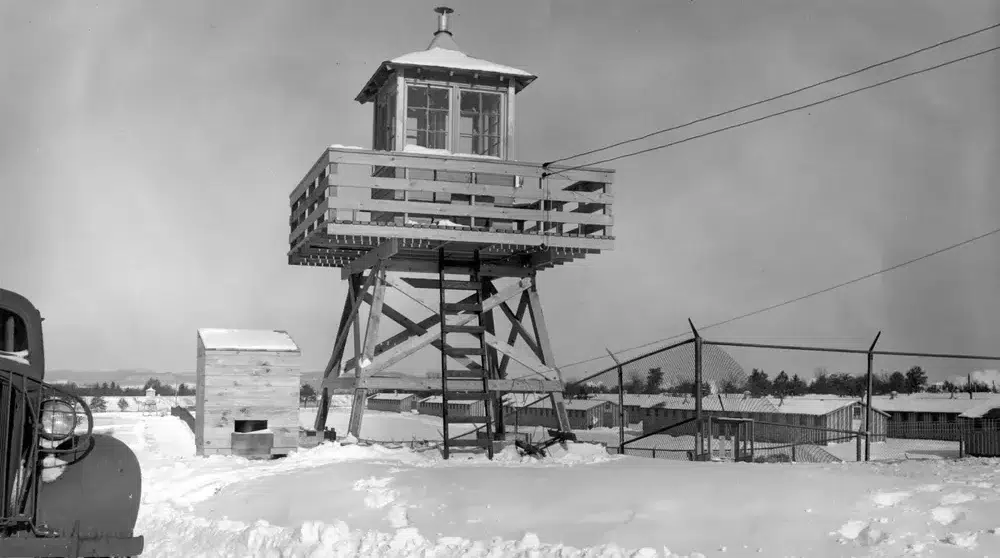Letters to Loretta: Surviving through the brutal German winter
- By Kaitlin Oster
Share This Article

Editor’s Note: Sandboxx News presents a World War II series by Kaitlin Oster on the power of hope, letters, and love in seeing us through the terrors and agony of war. You can listen to Kaitlin’s radio interview about the series here or visit her website here.
December 10, 1943
Dear Doll,
The noon day sun that melts the snow brings thoughts of you, and how easily my heart would melt if your rays could reach me. To date, I’ve received no word from home. I miss you lots, and love you more. Proof of my love lies in the fact that I haven’t looked at a woman since that unfortunate day some months ago. Whether I could or not, is immaterial, the fact still remains.
The men were freezing and already burned through their week’s ration of coal by the morning of January 4. The month was unforgiving: on some nights the temperature would drop below 10 degrees Fahrenheit. They relied heavily on keeping themselves bundled up and gathering around the stoves that were located in the middle of each barrack. Many men fell ill that month.
In December, the Red Cross delivered parcels that seemed promising – canned meats, medical supplies, blankets, and some fresh clothes. They were guaranteed one parcel per man that month and it felt like Christmas when the trucks came through the camp. Along with more men being permitted to keep their flight jackets, they were now given some warmer garments to get through the winter. Harold boiled at the thought of not having his flight jacket anymore; Every time he saw a man walk past in a bomber jacket, he thought back to the Nazi in Kehrenbach who took his off at gunpoint.

Harold found some sewing needles in his package; the Red Cross had included them for some reason. He found it humorous that something such as sewing needles were given out; “Loretta or Mama could use these to hem my pants,” he thought. Still, nothing should be wasted, so he put the needles in his kit of other miscellaneous items. This was their Christmas – the Red Cross packages. They had to be grateful.
Within their own personal rations, the prisoners rationed even further in an attempt to make every bite count. They felt blessed to have things to be accountable for, for once. The Germans weren’t reliable with food regardless of the season, and the men collectively agreed they could use a little more protein in their diets, especially with disease running rampant across the camps.
The next morning, Harold received hot water for breakfast, which was no surprise. He actually enjoyed it with the freezing January temperatures. When lunch was served several hours later, Harold found himself before another serving of hot water and a small piece of bread – smaller than what he was accustomed to. By dinner his stomach cramped with hunger; he didn’t want to dive into his Red Cross rations so soon. The men were served a measly half-ration of cabbage soup, with no bread, and black coffee. What was happening around the camp? Surely the other men noticed something was wrong when the already minuscule amounts of food they anticipated were shrinking in size.
Related: Letters to Loretta: Life as a World War II prisoner of war

“Why do you think they’re doing this? Are they trying to starve us to death? It’s the middle of winter, for God’s sake!” The men rumbled with agitation at the scant helpings they were served. Each day, there seemed to be less and less food. Harold found himself dipping into his canned rations, and some men were even splitting their rations amongst two or three men to keep everyone in some semblance of health.
“It’s half of what we normally get,” Harold replied without looking up. He stood around the stove in the middle of the barrack with a group of prisoners and swirled a tin can of now-cold black coffee around in his hand.
“It’s less than that, I’d bet,” another said.
“Maybe we’re getting out of here soon. Maybe they’re just using up the rest of the rations because we’re going to leave.”
“But we shouldn’t want to leave,” a prisoner interrupted, “not right now at least. You hear what’s going on up north in the camps? We don’t want that. Hell, I know I don’t want that. I hate this place through and through – I think we can all agree – but Lord, I’d rather be inside than mustered for no reason. Let’s just be thankful we got some new clothes from the Red Cross. They can try and cut our rations but we just have to stick together in this, boys.”

The rest of the men nodded and some replied with an “mhm” of agreement. No one really knew what was going on in the other camps but the prisoners at XVII-B wanted to stay in place, at least, that was until the weather warmed up. The rumors of the German forces weakening were promising to the soldiers, but that still left their fates in the dark. Would they be killed at the end of the war? Would they fight back? What lengths would the Germans go to in order to force control over these men? The group remained huddled around the stove for as long as it would remain hot. Eventually, they trailed off one by one to their bunks, Harold following in the crowd. It had been over a week since the men received full rations from the Germans. Everyone felt the pangs of hunger and exhaustion.
Morning mist hovered above the thousands of footprints left by soldiers in the parading area outside. Each impression overlapped and suffocated one another – the same suffocation the men felt. There was no wind as the sun continued to rise over XVII-B. It was painfully, beautifully silent. There were no men yelling out or hollering; no dogs barked and no German echoed from the watchtowers. Harold lay awake, catching glimpses of other prisoners who were also absorbed in the rare pre-dawn quiet.
Read more from Sandboxx News
- The SR-72 timeline: From initial design to ‘Top Gun’s’ Darkstar
- Operation Olympic Games: The first cyberweapon
- The favorite games of BUD/S instructors that SEAL candidates suffer through
- Garrett STAMP – The Marines nearly got a weird flying jeep during the Cold War
- Appearance is everything in the age of digital warfare
Related Posts
Sandboxx News Merch
-

A-10 ‘Thunderbolt Power’ Poster
$22.00 – $28.00 Select options This product has multiple variants. The options may be chosen on the product page -

F-35 ‘Lightning’ Poster
$22.00 – $28.00 Select options This product has multiple variants. The options may be chosen on the product page -

F-35 ‘Evolution’ Poster
$22.00 – $28.00 Select options This product has multiple variants. The options may be chosen on the product page
Kaitlin Oster
Related to: Military History

Trump’s NASA pick says military will inevitably put troops in space

The Air Force’s B-47B Stratojet bomber made Soviet generals sweat

Starman: The Green Beret superhero who was meant to be there

6 critical questions that will shape the future of Syria
Sandboxx News
-

‘Sandboxx News’ Trucker Cap
$27.00 Select options This product has multiple variants. The options may be chosen on the product page -

‘AirPower’ Classic Hoodie
$46.00 – $48.00 Select options This product has multiple variants. The options may be chosen on the product page -

‘AirPower’ Golf Rope Hat
$31.00 Select options This product has multiple variants. The options may be chosen on the product page -

‘Sandboxx News’ Dad Hat
$27.00 Select options This product has multiple variants. The options may be chosen on the product page
